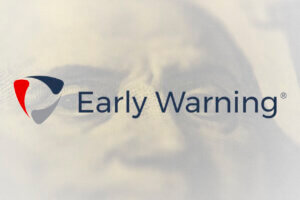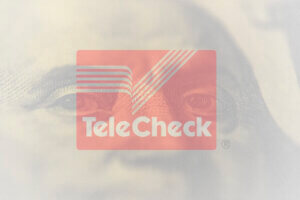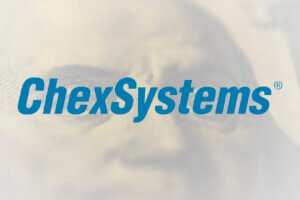This article is your ultimate guide to second-chance banking. It explains who these accounts are for, why they exist, and how they work. We’ll also compare them to alternatives like non-ChexSystems banks, exploring the advantages and disadvantages of each.
What Is a Second-Chance Checking Account?
Imagine you’ve had some bumps in the road with your banking history, maybe an unpaid overdraft or a bounced check. These incidents can be reported to consumer reporting agencies like ChexSystems and Early Warning Services, making it difficult to open a traditional checking account.
That’s where second-chance checking accounts come in.
Second-chance accounts, with their low approval requirements, act as a helping hand, offering you a fresh start and an opportunity to rebuild your banking reputation. These accounts are designed to encourage positive banking behavior and allow you to transition to normal accounts later.
A second-chance checking account provides access to essential banking services like check writing, ATM access, and online banking, all without the judgment or requirements of regular banks.
Who Is a Second Chance Banking For?
Second chance banking is designed for individuals with a negative banking history seeking access to basic banking services after being denied traditional checking accounts.
If you make any financial mistakes, banks, credit unions, or creditors report them as negative entries to consumer reporting agencies and remain on consumer reports for up to five years.
Q. How long does a bank blacklist last?
Negative information on your financial records (consumer reports) from ChexSystems and/or Early Warning System (EWS) typically remains for five years from the date of the incident.
>> Learn more: What to Do If Blocked by ChexSystems
Common negative entries in their financial records include:
- Unpaid overdrafts
- Outstanding balances
- Bounced checks
- Involuntary account closures
- Poor credit history
- Bankruptcy filing
- Low credit scores (bad credit)
When applying for a new bank account, financial institutions review consumer reports containing past banking activities to assess creditworthiness and make decisions. If negative entries are found, the application is typically denied.
Can you get a checking account if you owe money to another bank?
Opening a checking account with outstanding debt to another bank or credit union is typically very difficult. This is because the debts get marked as negative entries on your banking reports from ChexSystems or Early Warning Services, which is later used while approving new accounts.
>> Read up on Banks That Don’t Rely on ChexSystems.
What Are Consumer Reporting Agencies (CRAs)?
Consumer Reporting Agencies (CRAs) help banks and lenders assess creditworthiness for approving deposit accounts, granting loans and credit cards, or accepting checks. Let’s explore the main CRAs in each of these three categories.
The three main kinds of Consumer Reporting Agency
CRAs that specialize in checking and savings account history:
- ChexSystems: Tracks overdrafts, bounced checks, account closures, potential bank fraud, and account applications. Most popular among the three. Read up on ChexSystem 101.
- Early Warning Services (EWS): Provides consumer reports to financial institutions for assessing account opening risks. Learn more: Early Warning Explained.
- Cross Check: Offers information about a consumer’s banking history for risk evaluation by major banks, credit unions, employers, and landlords. Least popular among the three.
CRAs that specialize in credit history (credit bureaus):
- Experian: Gathers data associated with credit history, employment history, and property records and provides credit reports for insurers, lenders, and employers to use.
>> Read up on How To Erase Negative Items from Credit Reports.
- Equifax: Collects credit data, including payment history, credit utilization, and debt-to-income ratio, and is used for loan applications, employment, and housing.
- TransUnion: Collects data about credit history, employment history, and property records, which is used by utility companies, lenders, and employers.
CRAs that specialize in check verification:
- TeleCheck: Check acceptance company that helps reduce fraud and risk associated with accepting check payments. Read our ‘What is TeleCheck’ guide to learn more.
- Certegy Check Services: Offers real-time check authorization and verification services with instant accept or decline recommendations.
- Shared Check Authorization Network (SCAN): Maintains a database of bad check writers for real-time check verification.
Why Is Second Chance Banking Important?
Second chance banking is important because it offers a fresh start for individuals looking to rebuild their not-so-perfect banking history. It breaks down systemic barriers by bridging the gap in banking access for low-income communities, minorities, and those without prior banking experience.
By offering basic banking features until users rebuild their history and negative items fall off their records, second chance accounts serve as a vital stepping stone toward full financial inclusion.
Second chance banking helps individuals overcome past banking mistakes and access the essential banking services they deserve, regardless of age, community, ethnic background, or financial status.
Which Banks Offer Second Chance Bank Accounts?
Several banks now offer good second chance bank accounts. The best option for you will depend on your individual needs and preferences. However, here are our top four picks:
- PNC Bank (Foundation Checking)
- Chime (Checking Account)
- Varo (Bank Account)
- Wells Fargo (Clear Access Banking)
>> For the complete detailed list, check out the Top 15 Second Chance Checking Accounts.
How Do Second Chance Banking Accounts Work?
Second chance banks are like regular banks, except they overlook bad ChexSystems reports (and similar consumer files) and offer restricted accounts. These accounts allow you to rebuild your financial behavior while negative items naturally fall off your report, making you eligible for a standard account later.
Second chance accounts can be considered financial training wheels – stripped-down versions of regular accounts which prioritize basic functionality over bells and whistles.
Focused on minimizing risk for both the bank and the customer, they often involve restricted withdrawals, classes on money management, mandatory fees, limited services like check writing, and required direct deposits.
Although second chance accounts disregard past ChexSystems issues, they report your responsible use to the consumer reporting agency, which helps you build your credit history over time.
How to Open a Second Chance Bank Account
Opening a second chance bank account is typically a straightforward process, similar to opening a traditional bank account. Here’s a general overview of the steps involved:
- Select a Bank: Find a bank that offers second chance bank accounts that best suits your needs. Consider factors like monthly maintenance fees, minimum deposit requirements, fee-free access to ATMs, and minimal overdraft fees.
- Gather Documentation: Prepare the necessary documents, typically including proof of address (bank statement or utility bill), valid government-issued ID (driver’s license or passport), and Social Security number.
- Visit a Branch or Apply Online: You may open a second chance account by visiting a branch in person or completing an online application, depending on the bank’s policy
- Review and Sign Agreements: After completing the application, review the account terms and agreements before signing the agreements. Ask questions if anything is unclear.
- Fund Your Account: After application approval, fund your account through either cash deposits, ATM transfers, or mobile check deposits.
- Activate Your Account: Activate your debit card and set up online banking access to start using it for everyday banking transactions.
What Makes a Good Second Chance Bank Account?
When you’re getting a new second chance banking account, here are some essential things to look for:
- Reasonable Fees: Look for a second chance bank account with transparent, reasonable fees that you can afford. Avoid accounts with excessive monthly service fees that could worsen financial challenges.
- Low Minimum Balance Requirement: Prefer an account with a low or no minimum balance requirement to avoid hefty fees if the account balance drops below a certain level.
- Minimum opening deposit: Second chance accounts with low minimum deposit requirements create a low entry barrier, allowing easy access to basic banking needs.
- No Overdraft Fees: A good second chance banking account may avoid overdraft fees, offering options like lower fees or overdraft protection to ease financial strain.
- Graduation Option: Look for accounts that offer a pathway to “graduate” to a regular bank account after a certain period of responsible account management. This can provide a long-term goal to work towards.
Tip: If you consider yourself tech-savvy, look for bank accounts with budgeting tools, user-friendly mobile apps, and straightforward online banking for a seamless and intuitive experience.
Alternatives to Second Chance Bank Accounts
If the process of opening a second chance bank account seems too cumbersome, explore alternative options that offer similar financial services. Below are a few of them we recommend.
- Non-ChexSystems Banks & Credit Unions: Some institutions do not utilize ChexSystems to evaluate potential customers. Instead, they may use an alternative credit bureau or consumer reporting agency like the Early Warning Services. They may also use income verification and personal references to screen applicants.
>> Learn more: 8 Credit Unions that Don’t Rely On ChexSystems
- Online Banks: Online or Neobanks often have less stringent account opening requirements than brick-and-mortar banks. They may not use consumer reporting services and credit checks at all or may place less weight on negative items on your records.
- Prepaid Debit Cards: While not technically a regular bank account, prepaid debit cards enable you to manage your finances without a traditional deposit account like a checking or savings account. They can be loaded with funds and used for purchases, cash deposits, and ATM withdrawals.
Note: Second chance banking, while initially costly, offers long-term cost savings and flexibility compared to prepaid cards due to lower fees and wider features.
- Cash: One can manage finances with cash instead of using debit cards and digital banking services. It offers convenience and fee avoidance but has drawbacks. Check-cashing services may charge up to 10% of the dollars you’re chasing as fees, bill collectors may reject cash payments, and recovering lost funds can be challenging.
- PayPal: Alternative financial services like PayPal allow users to make online transactions and manage funds. Although convenient, one should be aware of the potential fees involved and ensure the platform suits your financial needs.
Important: Try not to get trapped in a cycle of debt by using poor alternatives like payday loans with exorbitant interest and tight deadlines. They are easy to get into but hard to get out if you fail to pay them back in time.
Second Chance Banks vs. Non-ChexSystems Banks
What is the difference between non-ChexSystems Checking and Second Chance Checking accounts? Although many consider both to be the same, they are not. They are similar in their purpose yet different in their approach to credit reporting and account features.
The one similarity is that both are suitable for people with a bad banking history.
The two differences are as follows:
- When applying for a non-ChexSystems bank account, your ChexSystems report will not be reviewed. Instead, the bank may use alternative credit reporting agencies to assess your creditworthiness.
In contrast, for second chance bank accounts, the bank may or may not check your ChexSystems report. If they do, it will typically be a very lenient evaluation.
- While non-ChexSystems bank accounts typically have similar restrictions and limitations as standard checking accounts, second chance accounts may impose additional limitations.
For instance, opening a second chance account may require completing financial education courses, and these accounts may have limited features, potentially excluding paper checks, interest on savings, or overdraft protection.
Things To Consider for a Second Chance Bank Account
The following six factors are crucial when selecting a second chance bank account, with the first two being of utmost importance:
- Ability to Upgrade: Choose a bank that allows account upgrades based on positive banking history. The account should offer a seamless transition to better options.
- Rebuilding Credit: Explore additional products and services offered by banks to improve your credit score, like credit builder loans and secured credit cards.
>> Read up on How To Boost Your Credit Score
- Ease of Use: Evaluate the simplicity of depositing funds and performing basic tasks with the account. Also, look for user-friendly interfaces in mobile banking platforms.
- Fees and Features: Examine the terms and conditions for fees for maintaining the account. See if they offer additional features like overdraft protection and paper checks.
- Low Minimum and Initial Deposits: Ideally, the account should have a minimum balance and opening requirements that you could easily afford.
- ATM Access: Prioritize banks with a wide and effective ATM network to reduce costs associated with withdrawals. Check if the bank reimburses ATM fees.
Benefits and Drawbacks of Opting for Second Chance Banking
To help you make an informed decision, here’s an overview of the pros and cons of opening a second chance bank account. Please note that some of these may vary depending on the specific bank.
Benefits:
- Enables access to a checking account despite past banking challenges.
- Offers a chance to rebuild banking history as negative items age off ChexSystems reports.
- May offer a transition to a regular bank account with responsible banking practices.
- Offers basic banking services similar to regular accounts but usually at lower costs.
- Prevents you from spending more than you have, helping you avoid going into the red.
Drawbacks:
- Limited features, potentially excluding paper checks and overdraft protection.
- Unlikely to offer interest on account balances.
- May require monthly direct deposit, maintenance fees, and minimum opening deposit.
- May impose restrictions on the number of transactions per month or week.







